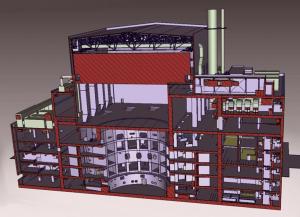Tokamak Complex construction is about to begin
The Tokamak Complex will be 80 metres high, 120 metres long and 80 metres wide. Over 600 people will be involved in the construction work, which will require some 150,000 m3 of concrete (plus 16,000 tonnes of rebar) and 7,500 tonnes of steel for the building structures.
In the coming weeks, work will begin on the formwork for the Complex basemat. Concrete pouring is scheduled to be carried out between April and December 2013. The Tokamak Complex will be completed in time for assembly operations to begin in 2016.



